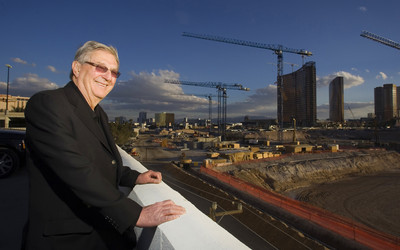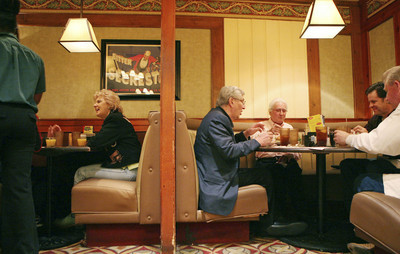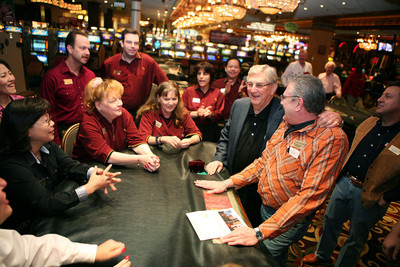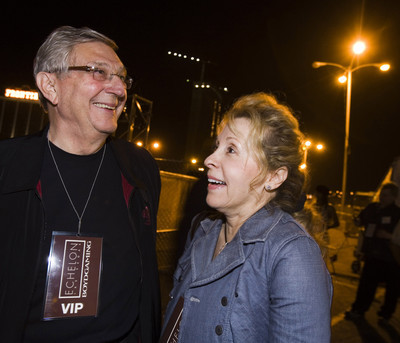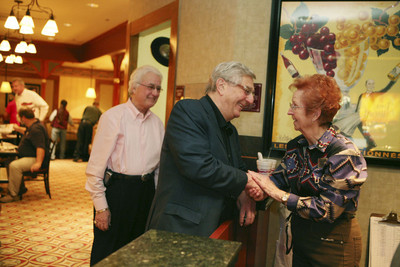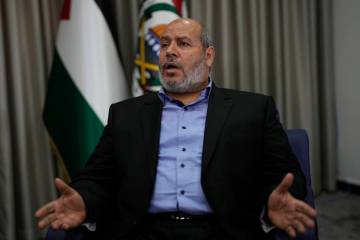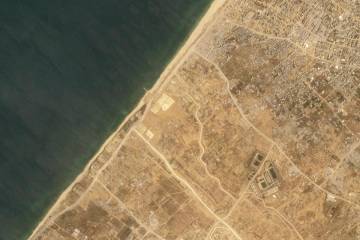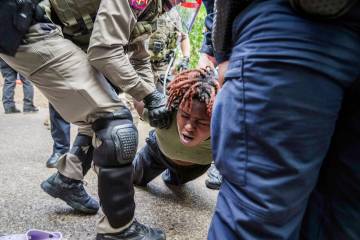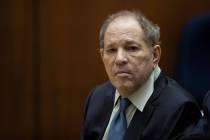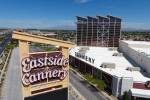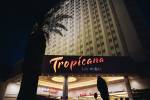HOMEGROWN COMPANY
It's appropriate that an interview with Boyd Gaming founder Bill Boyd took place in a large corner booth inside Sam's Town's Fresh Market Cafe.
Back in the 1970s and 1980s, the business of a much smaller Las Vegas often was negotiated over a sandwich at a casino coffee shop, rather than a corporate office.
"In the old days, it was much easier to get business done that way," Boyd recalled. "When you were at a property, it was easier to meet and see everybody (in the coffee shop). Everybody seemed to pass through here."
This particular noontime meeting on a crisp December day served two purposes. Boyd wanted to visit with some of the Sam's Town casino dealing staff as they readied for a busy weekend during the National Finals Rodeo. The company chairman also wanted to bid farewell to Frances O'Neal, who was retiring that day after 28 years with the casino. O'Neal was one of the original employees at Sam's Town.
"That was so nice of him to come and see me," O'Neal said after Boyd gave her a hug, a peck on the cheek and said thanks for the years of service. "He was always so nice to me."
Take a stroll through one of Boyd Gaming's original properties, and you're bound to run into an employee with a similar experience or memories of Bill Boyd or his father, the late casino pioneer Sam Boyd. Even management is hesitant to switch. Mike Garms, the general manager of Sam's Town, on Boulder Highway, has been on property since Day 1.
But the company has changed since the 1970s, when Sam Boyd and Bill Boyd would make the oftentimes daily trip among their three casinos: the Eldorado in Henderson, Sam's Town and the downtown California.
Today, Boyd Gaming has more than 23,000 workers spread among 17 casinos in seven states. With annual net revenues of $2.2 billion, the company is one of the gaming industry's publicly traded giants.
For 651 workers who have been employed by Boyd Gaming between 15 and 19 years and another 594 workers who have 20 years or more of service, however, the casino operator still feels like a family-owned business.
Instilling that same sense among Boyd Gaming's growing work force is one of the main reasons Boyd, 76, has stepped away from the day-to-day operations of the company, of which he and his family control 36 percent of the outstanding shares.
Boyd wants to spend his time doing what he did in the 1970s: traveling to and from the company's casinos, meeting with employees and interacting with customers. Only nowadays, the trips will be made by corporate jet rather than a drive along Boulder Highway. The Boyd name is attached to casinos in such locales as Tunica, Miss., Shreveport, La., Michigan City, Ind., and Atlantic City.
"Hopefully, I'll spend two or three days at each property," Boyd said. "It's important that our employees understand the Boyd style, especially how we treat customers. We're different from other big companies."
On New Year's Day, Boyd turned over the CEO duties to company President Keith Smith and took the title of executive chairman. Boyd hopes to serve as a living historical figure, a connection between the past and Boyd Gaming's future.
He wants to impart the company's story to its work force. Boyd Gaming's roots can be traced to 1952, when Sam Boyd, working as a shift boss at the Sahara, invested $16,000 to buy 1 percent of the casino.
Don Snyder, who spent nine years as the president of Boyd Gaming and has known Bill Boyd since the 1980s, said the new role is tailor-made for his longtime friend. Visiting with customers and workers harkens to a different era.
"Bill is the face, he is the heart, he is the soul of Boyd Gaming Corp.," said Snyder, who retired from the company in March 2005. "It's magic to watch him in the property visiting with the customers and the employees. The whole place lights up when he's there. That's a good thing for Boyd Gaming."
Ette Ventre, who has worked as a cocktail waitress at the California for 30 years, hopes Boyd Gaming employees across the country can experience some of the company's culture through its founder. She is glad he isn't stepping away completely.
"I'm hoping we get to see him a lot more now," she said.
A MAN OF HIS WORD
Bill Boyd is old school, Las Vegas old school.
He's a lawyer by trade, but his handshake is as strong as any legal document. Just ask those who know him best.
"Bill is a pillar of our industry," MGM Mirage Chairman Terry Lanni said. His company and Boyd Gaming are 50-50 joint venture partners in the Borgata in Atlantic City. "There are no pretenses about him. He's a man of his word, and his word is his bond."
The two most recent presidents of Boyd Gaming, Smith and Snyder, expressed similar views. If Boyd gave you his word, he followed through.
"It's refreshing these days because everything we do has a letter of intent that's 20 pages long," said Smith, company president since March 2005, who has been with Boyd Gaming for 17 years.
"If Bill gives you his word, that's as good as any contract you will ever get. In fact, it's probably better than a contract. If he looked you in the eye and said it, you can take it to the bank. I think there are very few people in the business today who still have that reputation."
Snyder was president of First Interstate Bank when he met Boyd. The bank handled the financing for construction of the 32-story Stardust hotel tower in the mid-1980s. Snyder said that because of the size of the loan, $110 million, he had to get other banks to participate. Casinos then were emerging in the financial markets, and a major reason behind that event, he said, was Boyd.
"Bill Boyd was a good poster child and the right face of gaming," Snyder said. "That allowed us to introduce the industry to other banks around the country."
Snyder joined the company as president in 1997 after Boyd first had persuaded him to head development of the Fremont Street Experience. Snyder had retired after First Interstate was sold to Wells Fargo, and the downtown project needed someone to help steer it along, that is, manage the strong personalities associated with the attraction.
Boyd operates three downtown casinos. Also sitting at the table were Steve Wynn, then Golden Nugget owner, Jack Binion, then Binion's Horseshoe boss, downtown pioneer Jackie Gaughan and then Fitzgeralds operator Jerry Turk, among others.
"Bill was always a voice of reason. He brought stability to the process," Snyder said. "His personality provided a calming effect and a more reasoned approach to a lot of things that oftentimes got very emotional when these personalities got together."
Even a $1.3 billion deal between two old friends wasn't a complicated matter. Boyd and Michael Gaughan negotiated the sale of Gaughan's Coast Casinos to Boyd Gaming in about 20 minutes over cocktails at Ruth's Chris Steak House.
When Michael Gaughan decided two years later he didn't like the corporate life and wanted to get back into casino ownership and management, the breakup simply took another 20-minute conversation.
Both parties said they were happy.
"I knew Bill a long time, and we were good friends. We still are good friends," Michael Gaughan said. "We had 90 percent of the original Coast deal done over that lunch, except for the final price."
Boyd said he had no problems letting Michael Gaughan walk away with the South Coast as part of the separation in exchange for his stock in Boyd Gaming.
The property was renamed Michael Gaughan's South Point as part of the exchange.
"My attitude was that we needed to find a solution that would make both sides happy," Boyd said. "It was good for both of us."
A LAWYER FIRST
While growing up in Las Vegas, Bill Boyd never really thought much about a career in the casino business.
After being discharged from the Army in 1955, he finished up law school at the University of Utah and returned home. He spent 15 years as an attorney.
One of his longtime law partners was the late Myron Leavitt, who served terms as lieutenant governor, district judge and state Supreme Court justice.
Meanwhile, Sam Boyd bought 3.5 percent of the downtown Mint in 1957.
In 1962, a legal client gave Bill Boyd 10 percent ownership in the Eldorado. The client wanted to pay his fees in stock. Boyd's father bought another 10 percent, and other partners invested. As the casino became popular, the Boyds bought out their partners. Bill Boyd, his father and his aunt and uncle ran the Eldorado as a family business.
He invested with his father once again in 1971 in a partnership that built the Union Plaza in downtown. The Boyds sold their interest in the Plaza to concentrate on a casino of their own, the California, which opened in 1975. That's when Bill Boyd downsized his law practice to concentrate on casinos.
"The first year was pretty tough," Boyd said. "What we thought about was making payroll every two weeks."
Boyd credited his father with targeting a niche market to fill the California's casino: Hawaiians. The Boyd family lived in Hawaii in the 1930s, and Sam Boyd ran casinos on the islands, albeit, illegal gambling halls.
"My dad used to say there was a game on every block. He wanted to make (the California) a home away from home for the Hawaii residents," Boyd said.
The idea worked. Today, roughly 80 percent of the California's business comes from Hawaii and Hawaiian transplants living in Las Vegas and the West Coast.
Bill Boyd set out to learn the different aspects of the casino business, dividing his time between the California and Eldorado. It was on one of those many trips down the Boulder Highway that he noticed a five-acre parcel on the market. When he contacted a real estate broker friend, he was told of an adjacent 11 acres on the corner of Nellis Boulevard and the Boulder Highway.
Boyd had observed the number of homes starting to go up in the area, which he said was equal distance between the Eldorado and California. A perfect site for a casino, Boyd thought. He and his father bought land.
"We thought we would show our board the land, and we figured they would want us to hold on to it," Boyd recalled. "But they said go ahead and build the casino now. So, that's what we did. My dad thought we were out of our minds, opening a place in the middle of nowhere. All the locals, at the time, gambled downtown. He thought we would lose everything."
But Boyd said Sam's Town had a crush of customers on opening day and hasn't looked back.
A GAMBLER AT HEART
Bill Boyd is a risk taker.
Sam's Town was the first big gamble he took. But the growth of Boyd Gaming can be marked by similar risk-taking events.
While other casino operators stayed local, Boyd reached outside Nevada, moving into the riverboat field, briefly flirting with Indian casinos, going public and moving into Atlantic City. Boyd Gaming is the first Nevada casino operator to move into the potentially expanding Florida market.
When he thought the company needed more of a presence in the locals market, he bought out his old friend Michael Gaughan.
Closing and tearing down the Stardust to make way for the $4.8 billion Echelon was one of his final decisions as CEO.
Taking a risk is not something Boyd does lightly, but he feels taking chances is part of his makeup.
"I've never been afraid to take a chance," Boyd said. "I think it's something that you inherit to a certain extent. It's within you, and it's never bothered me. Of course, I've always said to myself that if things go bad, I could always go back to practicing law."
Wynn Resorts Chairman Steve Wynn brought Boyd to Atlantic City. Wynn controlled the site where Borgata now sits. Originally, he was going to build a resort on the location, and Boyd would build a secondary property, sort of a Mirage-Treasure Island combination.
When Wynn sold Mirage Resorts to MGM in 2000, Boyd had a new partner. Lanni told him to go ahead and build the Borgata.
"We did a tremendous amount of research and saw what was lacking in the market," Boyd said. "We set out to build a Las Vegas-style place, and that's what we did."
Bob Boughner, a 32-year Boyd Gaming executive, oversaw, opened and managed the Borgata. He has returned to Las Vegas to serve as the CEO of Echelon. Boughner called Boyd "a prudent risk taker."
"Bill's background provided him with a great deal of discipline, and he's applied that discipline to running the business," Boughner said. "It's his nature to take risks, but he's never bet the company on those risks. Those risks are always calculated."
Wynn said Boyd's risk-taking comes directly from his father. Most sons of risk-taking men often times are a bit more conservative, Wynn observed. Not Bill Boyd.
"He's still Sam Boyd's kid, and that's a big deal to him," Wynn said.
REMEMBERING SAM BOYD
Bill Boyd thinks about his father much these days as he embarks on his new company role.
At Sam's Town, a tribute to the company's founder takes up an area inside the casino. A bust of his father and the family's historical photos pay tribute to the gaming pioneer. Sam Boyd's cowboy hat sits on display under glass.
A large photo of Bill and Sam shows the two men during the construction of Sam's Town.
Bill Boyd said his father was 42 years old when he made that 1 percent purchase of the Sahara. The bulk of the investment was borrowed. His father, he said, was a risk taker who would work seven days a week.
"He was ambitious, and he had a real feel for this business," Boyd said. "And for people. I think probably his greatest asset he had besides being tenacious was he had a great feeling for people. I think a lot of that came from working his way up as a dealer."
What Bill Boyd said he also learned from his father was to give back to the community. Sam Boyd started the Boys & Girls clubs in Las Vegas and Henderson. He was instrumental in getting a similar club off the ground in Reno.
For his part, Bill Boyd has given greatly around Southern Nevada to several charitable and community organizations. The Boyd family is one of the largest donors to UNLV, most notably a $30 million contribution to create and ensure the continuation of the Boyd School of Law.
Frank Fertitta Jr., the retired founder of Station Casinos, said his respect for Bill Boyd is twofold: as a casino operator and as someone who has made sure to reinvest in the community.
"Bill has to be one of most giving people in the casino business," Fertitta said. "You have to respect his success, but you also have to respect his charitable works as well."
That, Boyd said, was his parents' influence. Sam Boyd wasn't a fan of the outside corporations coming into Las Vegas to take over the gaming industry.
"He said what would happen was they would take the money back to Chicago, or New York or Beverly Hills or wherever it was," Boyd said. "He was a local guy, and he loved Las Vegas. They told me if you did well, you have to give back to the community. They did. It was important to them, and they instilled that in me."
The next generation of Boyds are involved in the family business. Sam Boyd, is an executive host at Sam's Town; William Boyd has been a vice president since 1990 and is on the company's board of directors while Marianne Boyd Johnson is the company's senior vice president and vice chairman of the board.
SEEING THE CUSTOMERS
Bill Boyd is looking forward to spending time not only with employees but also with longtime customers. He expects to be joined on his excursions by Judy Vieths, who has been "the lady in my life for 25 years."
During this next chapter, Boyd said he is looking forward to visiting old friends and making new ones.
At Sam's Town, on his way back to the coffee shop after rallying the dealers, Boyd was stopped by two gamblers who halted their game of blackjack to exchange holiday greetings with the company chairman. Boyd said the pair visit the casino annually during the National Finals Rodeo.
The connection with customers, especially longtime loyal company patrons, is something Boyd cherishes.
Take Lou and Jean Lopez, for example. The Hawaiian couple have been visiting the California at least four or five times a year for the past 20 years. Seeing Bill Boyd on a December afternoon walking through the downtown resort brightened their trip. Knowing they might see him more often in his new role was encouraging.
Boyd exchanged pleasantries with the couple, asked about their golf games and their holiday gift shopping before parting ways.
Just like the old days.
Contact reporter Howard Stutz at hstutz @reviewjournal.com or (702) 477-3871.



